As we mark the second anniversary of the COVID-19 pandemic, the key themes facing health citizens deal with money, inflation, and war — “piled on a nation stuck in COVID-19 survival mode,” according to the latest poll on Stress in America from the American Psychological Association.
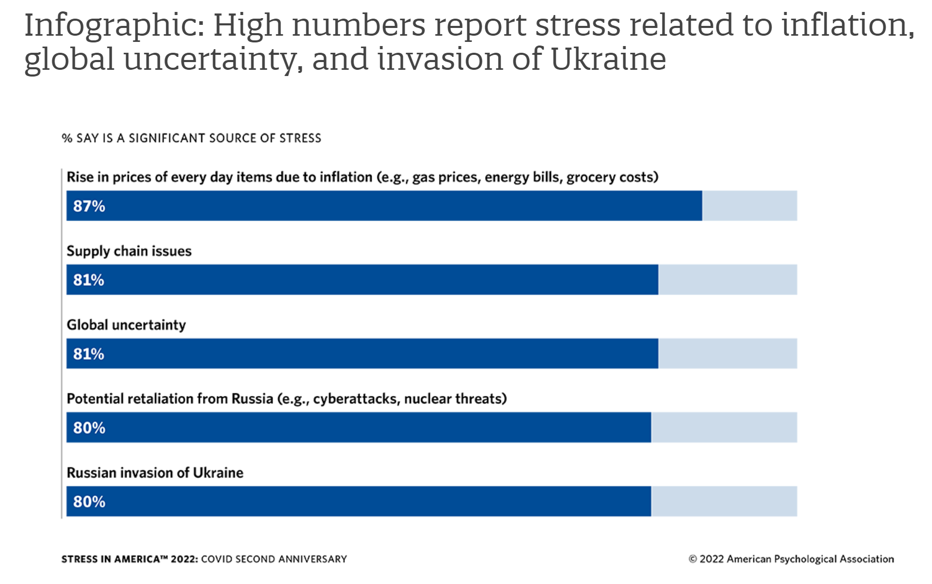 Financial health is embedded in peoples’ overall sense of well-being and whole health. Many national economies entered the coronavirus pandemic in early 2020 already marked by income inequality. The public health crisis exacerbated that, especially among women who were harder hit financially in the past two years than men were.
Financial health is embedded in peoples’ overall sense of well-being and whole health. Many national economies entered the coronavirus pandemic in early 2020 already marked by income inequality. The public health crisis exacerbated that, especially among women who were harder hit financially in the past two years than men were.
That situation was even worse for women of color.
The APA survey found that in February, prices of everyday items due to inflation added stress on people already feeling anxious.
Furthermore, supply chain issues, global uncertainty, and issues borne by Russia became significant sources of stress for at least 4 in 5 people in the U.S.
The War in Ukraine compounds the stress of the past two years, with fear and anxiety spiking, the APA noted in its report.
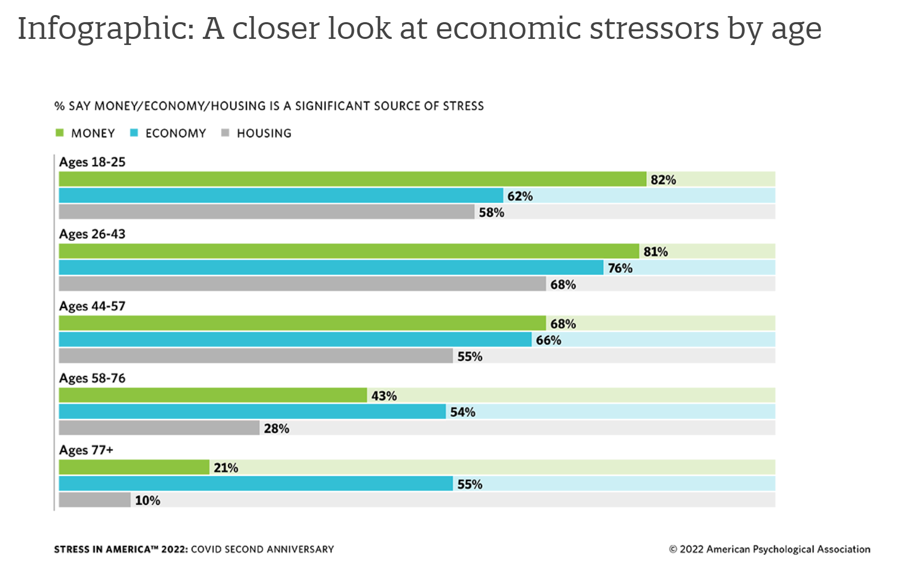 Nearly 9 in 10 people in the U.S. felt like there has been a constant stream of crises without a break over the past two years, with 84% of Americans saying that the Russian invasion of Ukraine is “terrifying” to watch.
Nearly 9 in 10 people in the U.S. felt like there has been a constant stream of crises without a break over the past two years, with 84% of Americans saying that the Russian invasion of Ukraine is “terrifying” to watch.
Three-fourths of people in America also agree that they are overwhelmed by the number of crises facing the world right now.
And two-thirds of Americans are concerned that the invasion of Ukraine is going to lead to nuclear war.
Closer to home, stress about money and the economy is rising, now at the highest level the APA has recorded since 2015.
By age, more younger people are significantly stressed by money issues than older people. Four in 5 people under 44 say money is a significant source of stress, The general economy is more stressful for people ages 58 and older, compared with stresses of money or housing.
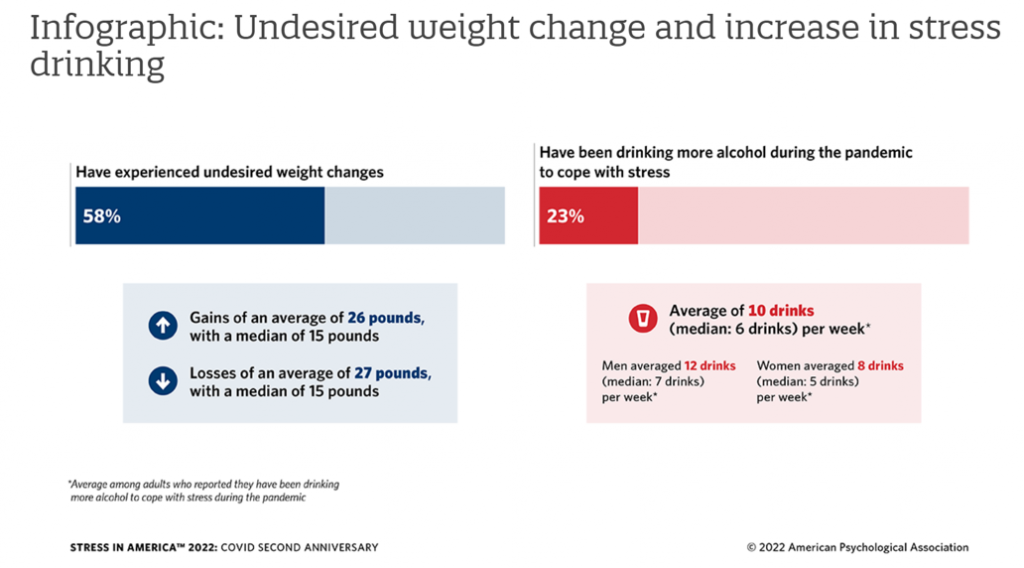 While the pandemic exacerbated mental and behavioral health challenges for millions of health citizens the world over, even by February 2022, Americans reported undesired weight changes and increases in stress drinking.
While the pandemic exacerbated mental and behavioral health challenges for millions of health citizens the world over, even by February 2022, Americans reported undesired weight changes and increases in stress drinking.
On the weight front, 58% of adults in the U.S. told the APA that they had experienced undesired weight changes, either…
- Weight gains of an average of 26 pounds, with a median of 15 pounds, or
- Weight losses of 27 pounds on average.
One in four people in the U.S. have been drinking more alcohol during the pandemic to cope with stress, an average of 10 drinks overall on a weekly basis: that has been 12 drinks for men, and 8 drinks for women.
It will be no surprise for you to hear that COVID has led to strained relationships for many people: 58% of U.S. adults reported experiencing a relationship strain related to the pandemic.
But 40% told the APA they had formed or connected relationships with people they would not have were it not for the COVID experience.
The 2022 Pandemic Anniversary Survey was conducted online within the United States by The Harris Poll on behalf of the American Psychological Association between February 7 and 14, 2022, among 3,012 adults age 18+ who reside in the U.S. Interviews were conducted in English and Spanish.
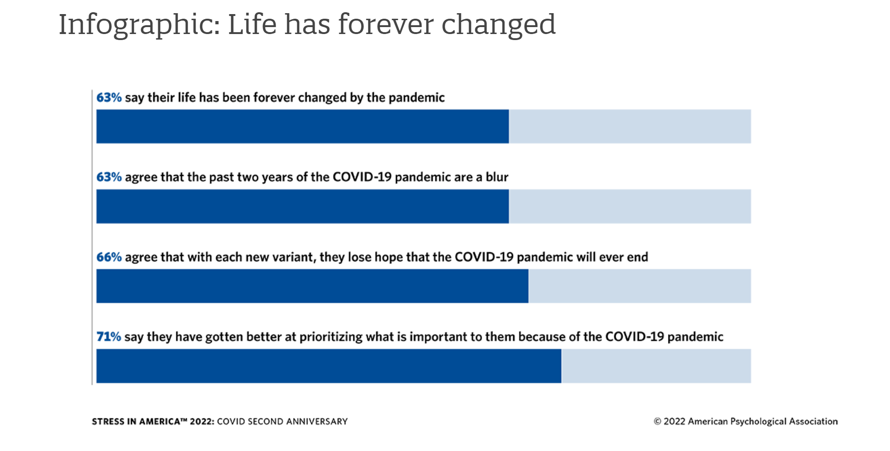 Health Populi’s Hot Points: Most people in the U.S. say their life has been forever changed by the pandemic…that the two years of dealing with the coronavirus have been “a blur”…and, that with each new variant, they lose hope that COVID-19 will never end…
Health Populi’s Hot Points: Most people in the U.S. say their life has been forever changed by the pandemic…that the two years of dealing with the coronavirus have been “a blur”…and, that with each new variant, they lose hope that COVID-19 will never end…
On the upside, COVID-19 clarified most peoples’ priorities: 71% of people told the APA that they have gotten better at identifying what is important to them because of the pandemic.
As if the citizens of the world have not been traumatized enough by the virus and its variants, by social unrest and worsening income inequality, and by supply chain challenges causing the start of an inflationary period, next comes Russia’s invasion of Ukraine — another stressor felt by people the world over in support of the Ukrainian people.
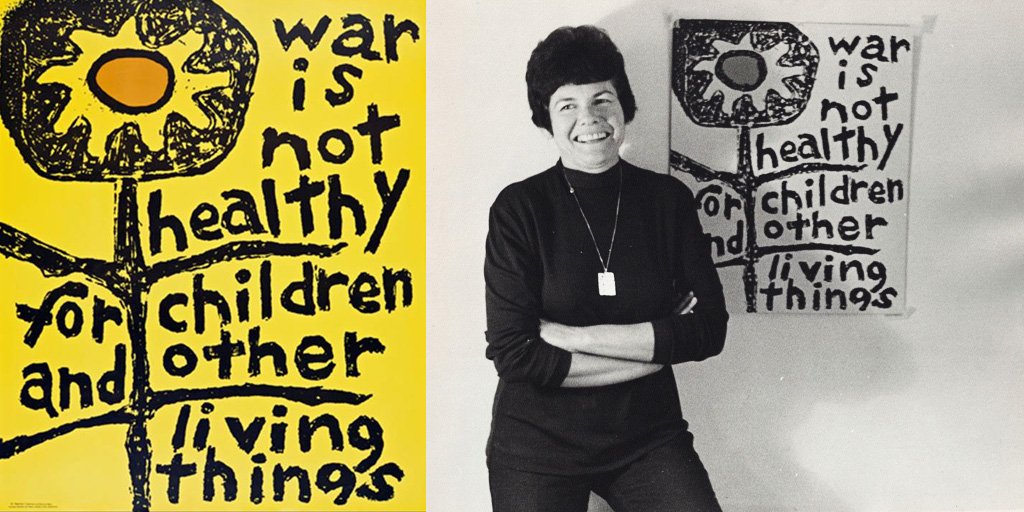 I am reminded of the mantra conceived in 1967…
I am reminded of the mantra conceived in 1967…
War is not healthy for children and other living things.
created by the founder of Another Mother for Peace,
Lorraine Schneider created this poster for the organization, which in its time appeared on all kinds of media — t-shirts, bumper stickers, and posters.
As The Temptations and Edwin Starr sang under the Motown label back in 1968,
War…what is it good for…absolutely nothing.
And here we go again….ladling stress onto more stress the world over….with Ukraine in our hearts and minds, and Russia contributing to Stress in America, the APA tells us.
Listen to Brother Edwin.


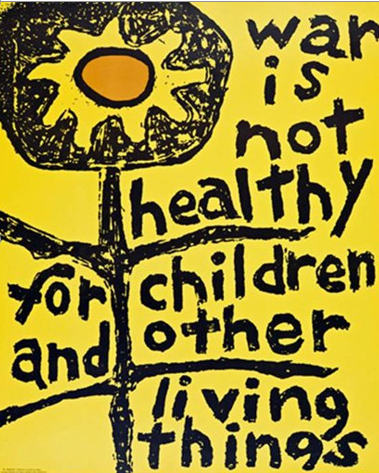


 I am so grateful to Tom Lawry for asking me to pen the foreword for his book, Health Care Nation,
I am so grateful to Tom Lawry for asking me to pen the foreword for his book, Health Care Nation,  I love sharing perspectives on what's shaping the future of health care, and appreciate the opportunity to be collaborating once again with Duke Corporate Education and a global client on 6th May. We'll be addressing some key pillars to consider in scenario planning such as growing consumerism in health care, technology (from AI to telehealth), climate change, and trust -- the key enabler for health engagement or dis-engagement and mis-information. I'm grateful to be affiliated with the corporate education provider
I love sharing perspectives on what's shaping the future of health care, and appreciate the opportunity to be collaborating once again with Duke Corporate Education and a global client on 6th May. We'll be addressing some key pillars to consider in scenario planning such as growing consumerism in health care, technology (from AI to telehealth), climate change, and trust -- the key enabler for health engagement or dis-engagement and mis-information. I'm grateful to be affiliated with the corporate education provider  Thank you FeedSpot for
Thank you FeedSpot for